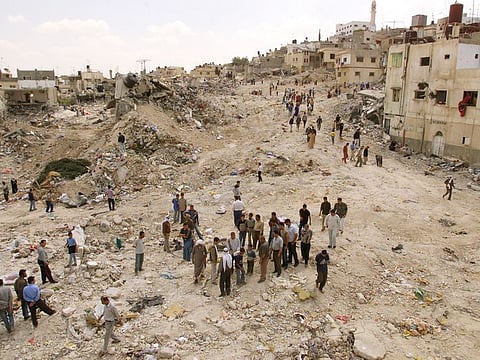What comes next: Can Israel escape its ICC moment?
Without international will, the ICC probe could become another sad case of justice denied

As soon as the Chief Prosecutor of the International Criminal Court (ICC), Fatou Bensouda, declared on December 20 that she found “reasonable basis to proceed with an investigation into the situation in Palestine”, Israel hit back.
This is “pure anti-Semitism”, Israeli Prime Minister, Benjamin Netanyahu, accused The Hague.
“They say the Jews do not have a right to live in the land of the Jews, in the Land of Israel. Well, we say, shame on you,” he charged, promising that Israel will overcome the ICC “just as we overcame other anti-Semites in history”.
Bensouda’s decision to investigate alleged war crimes in Palestine starting from June 14, 2014 is not final; and there are several hurdles that stand in the way of achieving justice.
It is clear that justice for Palestinians in the face of Israeli aggression, itself fuelled by unconditional American support, is not at all possible if it is not accompanied by regional and international unity.Ramzy Baroud, editor of The Palestine Chronicle.
One of these hurdles is the ICC’s own lack of commitment and its often politically motivated decisions that make it receptive to outside pressures.
In fact, Bensouda’s verdict has taken more time than it should have, a five-year preliminary examination, to be more precise.
Now, the matter is in the hands of a ‘pretrial chamber’. The chamber is expected to make a decision, within a 120-day period, on whether the court has jurisdiction to rule over the matter in the first place.
The three judges’ decision could lead to a trial or could pass the baton to the appeal chamber, if the pretrial chamber rules in favour of Israel by concluding that the ICC has no legal jurisdiction over the matter.
In its statement, the ICC asserted that the court saw “no substantial reasons to believe that an investigation would not serve the interests of justice”.
But can the “interest of justice” be served while the United States government continues to wield a massive stick, using its diplomatic, political and financial clout to ensure Israel emerges unscathed from its latest legal scuffle?
There is little doubt that Michael Lynk, the United Nations Special Rapporteur for the situation of human rights in the Palestinian territory, is absolutely right: A formal ICC criminal investigation into war crimes in Palestine is a “momentous step forward in the quest for accountability”.
Palestinians must exploit this opportunity
He is also correct in his assessment, published in the United Nations Human Rights Officer of the High Commissioner website, that “accountability has, until now, been largely missing in action throughout the 52-year-old occupation”.
That issue notwithstanding, the Palestinian leadership and all political parties in Palestine should exploit this unprecedented opportunity of holding Israel accountable.
As soon as the ICC issued its statement, news reports surfaced conveying a sense of “panic” in Israel. The Times of Israel reported that an Israeli government meeting to discuss the ICC decision was held shortly after, with the aim of considering a suitable response, including the possibility of preventing ICC investigators from reaching Israel.
This is eerily familiar. Israel has denied entry to — or refused to cooperate with — international investigators and observers on many occasions in the past.
Following a UN planned investigation into alleged Israeli war crimes in the Palestinian refugee camp of Jenin in 2002, the Israeli government quickly moved and, sadly, succeeded in blocking the investigation altogether.
It has done so time and again, often demonising the very individuals entrusted with the mission of examining the illegality of Israel’s behaviour in the context of international law, just as Netanyahu has done with Bensouda. Well-respected judges and international law experts such as Richard Goldstone, Richard Falk, and John Dugard, were vehemently attacked by Israeli officials and media and, by extension, by the US government and media as well.
Legal accountability Israeli crimes in Palestine
This time, Israeli officials who have thus far evaded every legal accountability for their crimes in Palestine, have every reason to worry. If they are indicted, all 123 member-states of the ICC would be legally obligated to adhere to The Hague’s ruling, including the apprehension of any convicted Israeli war criminal.
Israel has managed to survive dozens of UN Resolutions as well as a litany of legal reports and indictments by the United Nations and UN-affiliated organisations, largely because of blind and unequivocal US support, which has shielded Israeli war criminals from ever answering to their horrific actions in Palestine.
The high level of the ICC investigations, however, places the legal push against Israel at an entirely new level. This is uncharted territory for Israel, the United States, Palestine, the ICC, and the international community as a whole. There is little doubt that some joint Israeli-American effort is already underway to develop strategies aimed at countering, if not altogether dismissing, the ICC investigation.
It is clear that justice for Palestinians in the face of Israeli aggression, itself fuelled by unconditional American support, is not at all possible if it is not accompanied by regional and international unity, and a clear and decisive decision by all parties concerned that Israel, once and for all, must pay for its military occupation, racist apartheid laws, protracted siege on Gaza, and the many massacres in between.
Without this kind of international will, the ICC investigation could become another sad case of justice denied, a non-acceptable option for any justice-seeking individual, organisation and government, anywhere in the world.
— Ramzy Baroud is a journalist and the Editor of The Palestine Chronicle. He is the author of five books. His latest is These Chains Will Be Broken: Palestinian Stories of Struggle and Defiance in Israeli Prisons.



